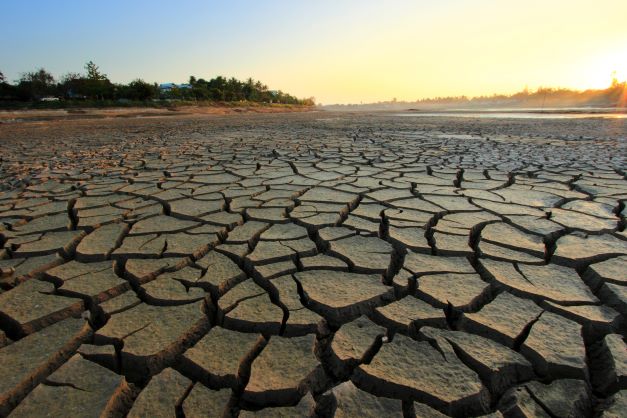The ongoing drought in California could impact crop yields and quality this year and next, and could also drive up the prices of finished products for retailers and consumers in the future, according to producers in the state.
“I think last year [the pandemic] was unnerving, but not having water for your crops is even more unnerving,” said Jake Samuel, CEO of Sunrise Fresh Dried Fruit Co., a grower of cherries, walnuts, and almonds located near Stockton in the northern San Joaquin Valley.
California is in the midst of a multi-year drought that is compounded by abnormally high temperatures, and water management authorities throughout the state have imposed restrictions on water use. Gov. Gavin Newsom this month expanded the state’s regional drought state of emergency to include 50 of the state’s 58 counties, and asked Californians to voluntarily reduce their water use by 15 percent.
This past winter’s rainfall was about half of what was expected in the state, leaving reservoirs well below their normal levels heading into the hottest, driest months of the year, which are a key growing season for many of the state’s crops.
For example, July and August are critical for the growth of walnuts, because that is when the meat fills out the shells, Samuel explained. The water restrictions, combined with the high temperatures, could put stress on the trees that will end up having a negative impact on the walnuts.
“We are probably going to see some serious quality issues this year,” said Samuel.
Sunrise Fresh is currently growing next year’s cherry crop, meanwhile, which could also be impacted as water restrictions are expected to linger through the rest of this year.
“We are starting to think now that we are going to see some lower-quality fruit for next season,” said Samuel.
The drought could force some crop farmers in California to let their fields go fallow, he said, which could have repercussions throughout the economy in terms of job losses, bankruptcies, and higher prices.
Thom Dille, CEO of Lincoln, California-based Fiddyment Farms, has similar concerns about his pistachio crop, although he said he was hopeful that his yields will be normal as he has been buying water from other districts to ensure that his crop is viable.
“We won’t know what the harvest is like until late August or early September,” he said. “The nuts may be smaller than normal due to stress because of the heat, and there may be some restriction on size because of the water shortage.”
Currently the water district to which Fiddyment Farms belongs has cut his water use by half an acre-foot (an acre-foot is about 326,000 gallons, or enough water to cover an acre of land, one foot deep).
“That’s a big hit,” said Dille. “The drought also affects well water, and the price of water out on the marketplace.”
This year, he said the farm has been paying $1,400 per acre-foot for water from outside the normal channels, compared to $200 per acre-foot in a normal year.
“It’s a very tough world when a drought occurs, and the longer it goes, the longer there will be a high price for whatever water is available,” Dille said.
Growers said state and local authorities have been working cooperatively with the agriculture industry and scientists to better manage the state’s limited water resources, in large part through the Sustainable Groundwater Management Act. Farmers have adopted innovative irrigation solutions that focus water on the roots of plants, for example, to ensure it doesn’t go to waste.
“SGMA is supposed to put everything in balance—agriculture, environmental needs, human consumption, health and safety—and of course, everyone is playing their political games with it,” said Samuel, who said quick, decisive action is needed to support the state’s massive agricultural economy.
Jill Giacomini Basch, co-owner and chief marketing officer of Point Reyes Farmstead Cheese Co., agreed.
“Ultimately, we are looking for state and federal agencies to subsidize farming and food production, to get us through this tenuous time,” she said.
The cheesemaker, which maintains 450 cows to produce the milk for its cheeses, has had to buy 10 truckloads of water per week to support its operations, said Giacomini Basch.
“We have not had to do that ever in the history of our farm, and the farm has been in existence since 1959,” she said, noting that the water is also coming “at a very high cost.”
“We have had droughts over the last 60 years, but never to this severity,” she said.
The company takes several measures to conserve as much water as possible, such as by using excess wastewater for pasture fertilization.
“We are incredibly sustainable in our farming methods to conserve as much water as possible, but it is a very water-intensive operation,” Giacomini Basch said.
At Sunrise Fresh, meanwhile, Samuel said it’s not feasible for the farm to truck in water because of the volume that would be needed, but it has begun doing “deficit irrigation,” which seeks to keep the trees alive and the crops viable while optimizing water use. In addition to its own dried cherries and nuts, Sunrise Fresh also buys blueberries, peaches, and other fruits from local farms to process into dried fruits, which it then sells online.
“We’re trying to keep a viable crop to the end of the year,” Samuel said, but added that it’s too early to tell how much impact the severe conditions will have on the quality of the company’s products.
“That’s the unknown as we go into harvest season for all of the crops,” he said.
Related: California Grocers' Capacity Restricted; Western Fires Impact Specialty Food Business.

